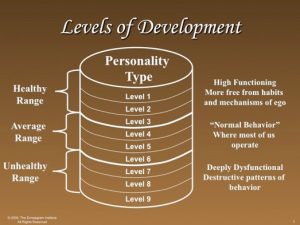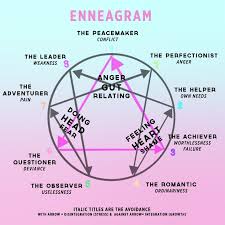
Shownotes
Wisdom-Trek / Creating a Legacy
Welcome to Day 1063 of our Wisdom-Trek, and thank you for joining me.
This is Guthrie Chamberlain, Your Guide to Wisdom
The Enneagram Type Combinations – 7&7; 7&8; 7&9 – Ask Gramps

Wisdom – the final frontier to true knowledge. Welcome to Wisdom-Trek where our mission is to create a legacy of wisdom, to seek out discernment and insights, and to boldly grow where few have chosen to grow before.
Hello, my friend, I am Guthrie Chamberlain, your captain on our journey to increase wisdom and create a living legacy. Thank you for joining us today as we explore wisdom on our 2nd millennium of podcasts. This is Day 1063 of our trek, and it is time for our Philosophy Friday series. Each Friday we will ponder some of the basic truths and mysteries of life and how they can impact us in creating our living legacy.
As we continue on this trek called life, sometimes we have questions about life, so our Friday trek is a time when we can “Ask Gramps.” Gramps will answer questions that you would like to ask your dad or granddad, but for whatever reason are unable to. No matter how old we are, I know that all of us would like the opportunity to ask Dad or Gramps questions about life in many areas.
Understanding ourselves and how others may interpret life through their paradigm better allows us to interact with each other with more love and compassion. This can be achieved by utilizing a profound tool called “The Enneagram.” The tool that we refer to as the Enneagram (Any-a-Gram) is a circle with nine interconnected points (Ennea refers to 9 and Gram referring to a drawing). Check out today’s or a prior week’s Wisdom Journal for a representation of it. I have also included a copy of “The Enneagram At-A-Glance,” which was compiled by Suzanne H. Eller in today’s Wisdom Journal. If you would like a PDF copy, click on the link in today’s Wisdom Journal located on our website Wisdom-Trek.com.
For additional insight, I recommend the book The Road Back to You written by Ian Morgan Cron and Suzanne Stabile. It is an excellent book about an enneagram journey to self-discovery from a Christian perspective.
We have concluded our deep dive into the nine types which are “The Reformer,” “The Helper,”“The Achiever,” “The Individualist,” “The Investigator,” “The Loyalist,” “The Enthusiast,” “The Challenger,” and “The Peacemaker.” Thirteen weeks ago, we began a series of episodes on Type Combinations, answering the question, “What are the potential relationship benefits and issues with each combination?” Covering all of the 45 different potential type combinations will take several weeks, but will be valuable in understanding each other, regardless of what type you are and what type those with whom you interact with each day are.
Since we are exploring the Enneagram in detail, I would also recommend reading the Wisdom Journal for each Friday to see the diagrams presented each week. As helpful as the Enneagram is, keep in mind, it is still only a tool and cannot replace or usurp the precepts that are found in God’s Word. All decisions and actions that we make in life must be in harmony with God’s precepts.
So the questions for the next several weeks will be…
“Hey, Gramps, why do people act and react to situations and circumstances in life so differently? How can I gain wisdom to better understand myself and others so that I can love, serve, and minister to them on a deeper level?”

The Enneagram Type Combinations
Enneagram Type Seven (the Enthusiast)
with
Enneagram Type Seven (the Enthusiast)
What Each Type Brings to the Relationship
As with all double-type relationships, two Enneagram Sevens generally bring the same qualities to each other. Therein lies both a main source of the attraction as well as one of the main pitfalls. Thus, the level of health of each person is especially important for these types of relationships as are their dominant instincts. The key characteristics of double Seven relationships are easy to spot: high energy, spontaneity, frequent travel and entertaining, and an interest in anything new or that promises to open new possibilities. If both Sevens are psychologically healthy and well balanced, there is a noteworthy joyousness and sense of abundance that permeates their relationship and which spills out to everyone around them. A healthy double Seven relationship is emphatically happy—even radiant and exuberant-and both parties enjoy sharing their happiness with as many others as possible. They are thoughtful, sensitive, idealistic, hospitable, and generous. Double Seven couples are sociable and unusually good company for others as much as they are with each other.
Each brings to the relationship a spirit of personal freedom that is noteworthy. Neither wants to be tied down in routines or empty, formal commitments, and so both Sevens are determined to not impose many rules or expectations on the other. They want their relationship to be guided by the fact that both parties positively want to be with the other rather than feeling that they are locked into some constricting set of obligations. Both Sevens bring a sense of possibility, open-endedness, experimentalism, and realism that enables them to build a life together—while making it an enjoyable experience for themselves and their circle of family and friends. Double Seven pairings are optimistic and resilient, and always ready to pick themselves up and start over again when they run into difficulties. Gratitude for the relationship—and for finding each other—is the guiding spirit.
Potential Trouble Spots or Issues
Building a relationship usually takes time together, and patience to weather the disappointments and disillusionments that are also usually part of the picture. One of the main problems with double Seven relationships is that of impatience—of wanting the relationship to be more complete and developed than it really is. While double Seven pairings have no lack of energy and high expectations for their relationship, they may find it difficult to stay with both themselves and the other as both work through the growing pains of the relationship. As time goes on and the relationship is no longer the stimulating experience that it once was, Sevens begin to turn their attention elsewhere, possibly to their work or to other involvements.
Both Sevens feel that somewhere in the world exists the perfect person for them. Sevens are terrified of missing out on whatever in life they are meant to have. They hate the feeling that by committing themselves to one thing-whether it is one person, one place to live, or one career—they are limiting their life in some fundamental way. In short, Sevens tend to be commitment adverse, and it is a measure of their psychological health when they can commit relatively easily and permanently to someone. In a double Seven relationship, this problem is compounded, and one of the Sevens must be the first to risk commitment—and possible rejection.
Another problem for double Seven relationships is that both tend to be impulsive and irreverent, often saying and doing whatever brings relief in the heat of the moment. During arguments, things are said which cannot be unsaid, and feelings may be irreparably hurt by either. Both can be insensitive, self-centered, and unreliable. Both also tend to crave constant stimulation which can lead to a hectic social life. This can be exciting if both parties do things together, but if they begin to have separate interests and different sets of friends, their social lives will pull them apart. They may begin to have little time for each other or for their family. Someone is bound to feel left out, and on some level, each Seven is determined that it will not be him.

Enneagram Type Seven (the Enthusiast)
with
Enneagram Type Eight (the Challenger)
What Each Type Brings to the Relationship
Both Enneagram Sevens and Eights are highly self-assertive, independent, and strong-willed. Both types also resist being controlled or limited by authorities or even by internal, psychological mechanisms. Once someone (or even some inner voice) says do not, both Sevens and Eights respond with defiance and a desire to push the limits, whatever they may be. Both types are practical, this world-oriented, not necessarily worldly or materialistic, but concerned with concrete affairs and finding happiness and fulfillment in the here and now. Neither likes to postpone their satisfactions or to settle for vague promises about the future. Both tend to overspend their budget on a bountiful lifestyle that is a source of pleasure for themselves and their friends and family. They love to entertain and offer the best there is to others as a sign of their generosity and as a signal of their success and standing in the world.
Both are high energy people, often gifted with vitality and gusto for life that is noteworthy. A Seven/Eight couple can get a tremendous amount done and are revitalized by staying active. They are adventuresome and are willing to try new things in their relationship. They are also both extremely outspoken and do not hold themselves back from voicing their own opinions or making their needs known. Sevens bring more lightness and a sense of fun and excitement, trying something new and different for the sake of keeping things fresh and stimulating. They are also usually the more talkative of the two: Sevens are usually highly engaging storytellers and raconteurs, turning their adventures (and catastrophes) into entertaining tales. Eights are usually surprisingly more reserved and moody than is often recognized, and they rely on the Seven to lighten the atmosphere and to make their practical affairs more fun and enjoyable. Eights also bring directness, decisiveness, and the willingness to face difficult situations with determination and persistence.
Potential Trouble Spots or Issues
While a Seven/Eight couple can be an extremely productive, high-energy pair, problems may begin if the constructive outlets for that energy are thwarted or misguided. Sevens and Eights both need to find positive outlets for their prodigious energies and interests, and if they do not, they will inevitably discover destructive ways of releasing them. They may also begin to turn against each other or bring each other down in a kind of dark collusion that can have tragic consequences for them both. Both Sevens and Eights are extremely strong-willed and independent, and so both resist being controlled by the other, often taunting the other with their lack of influence over them. Eights tend to be authoritarian and bullying, ordering the Seven around and making threats if they are disobeyed. Sevens will attempt to avoid being controlled, and can become highly insulting and contemptuous of the Eight and their heavy-handed tactics. Both types will flaunt the other’s inability to have their way, as if their defiance were a badge of honor. Both types can be extremely selfish and self-centered, feeling that the world revolves around them and their desires. Of course, this builds in the likelihood of conflicts.
Both types can also be verbally crude and insulting, frequently saying things that other types might only occasionally allow themselves to think. Their fights can be gargantuan brawls and public scenes in which physical abuse and violence may also play a significant part. The problem is, however, that both types tend to be addicted to excitement and the adrenaline rush of reckless behavior. Once they have begun to build their relationship on a certain level of physical excitement (whether it is from sexuality or violence), it is difficult for this couple to turn back to something more moderate. Anything less than being death-defying seems lifeless and boring. They may, however, push the limits once too far, with tragic consequences not only for their relationship, but for everyone around them.

Enneagram Type Seven (the Enthusiast)
with
Enneagram Type Nine (the Peacemaker)
What Each Type Brings to the Relationship
Enneagram Sevens and Nines are one of the most often seen pairings of the types because they bring a good mix of similar and opposite qualities. Fundamentally, Sevens and Nines are both positive outlook types who are optimistic, upbeat, and who prefer to avoid conflicts and negatives in their lives and in their relationship. Both types are friendly, sociable, and generally happy with themselves and with their lives. Neither is typically introspective or brooding, preferring to get on with things rather than to look backward or to stew over failures or disappointments. Both are able to forgive and forget and to make the best of their limitations, whatever they might be. They might be separated physically or have few financial means, but Sevens and Nines can make the best of these circumstances and continue to build their future together. Both tend to be practical, although both can have a romantic streak and a physicality that adds spice to their relationship. Both are also often funny and can make even the most mundane events pleasurable and pleasant. Sevens provide the stimulation, Nines the audience.
On the complementary opposite side, Sevens are more active and self-assertive than Nines; they tend to take initiatives, to make plans, to have multiple interests, and to provide the energy for the couple. Sevens are mentally quick, self-confident, curious, open to new experiences, and resilient when there are setbacks. They bring fun, sparkle, and a sense of adventure. Nines bring a sense of steadiness, support, and acceptance to the relationship. They tend to be more sympathetic and soft-hearted than Sevens, as well as more relaxed and undemanding of themselves and their environment, including other people. Nines are also often generous and willing to make personal sacrifices to help others and to make them happy. Their personal simplicity and uncomplicatedness mesh well with the more assertive qualities of the Seven. As long as neither takes advantage of the other, there is a good balance between energy and relaxation in this couple.
Potential Trouble Spots or Issues
One of the main areas for potential problems is the fact that neither Sevens nor Nines are usually adept at working through negative or painful aspects of their lives or of the relationship. Both would prefer everything to be kept on the positive side; neither one wants to fall into the possibility of depression or to otherwise cut off their chance for happiness. At most, they will briefly acknowledge a problem or conflict in their relationship by blaming the other: both types tend to become anxious, critical, and edgy when under stress, taking these things out on someone else rather than working through negative feelings themselves. Both types also tend to be blind to their own share of responsibility for how the relationship has deteriorated, including their own contribution to communication problems. Nines tend to collapse in the face of the Seven’s angry demands, withdrawing into silence and, eventually, inaction. They become increasingly unable to make sense of the Seven’s grievances, and so they become stubborn and shut down further, with occasional outbursts of anger or anxiety, or both.
Of the two types, Sevens are far more equipped to talk about whatever is bothering them than Nines, although this does not mean that Sevens are necessarily more able to face what is really bothering them much less resolve it. Sevens tend to impulsively say whatever comes to mind and to fall into excoriating verbal abuse of the Nine whenever the Seven feels frustrated. Sevens often feel that the Nine is too checked out and unresponsive to them. Nines seem perpetually indecisive, slow, and ineffectual. Sevens’ criticisms and outright contempt for the unresponsiveness of the Nine only makes Nines retreat further from them and disengage from the situation. However, Sevens often feel that they cannot help themselves and that honesty demands that they tell the Nine how unhappy they are with them. One of the sunniest and most carefree couples can become one of the